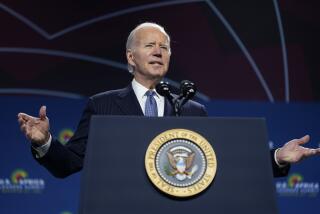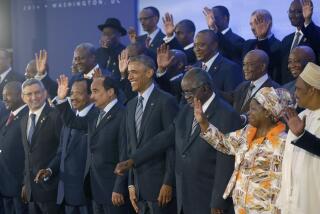The United States and South Africa: So Close and Yet. . .
- Share via
PRETORIA, South Africa — The United States and South Africa agree on just about everything, Secretary of State Madeleine Albright and South African Deputy President Thabo Mbeki said Saturday.
Except for Sudan.
Except for Libya.
Albright met Mbeki, President Nelson Mandela’s heir apparent, to dramatize the generally good relations between the United States and post-apartheid South Africa. Unlike the earlier stops on her seven-nation, seven-day tour of Africa, South Africa measures up to Washington’s idea of what an African state should be: democratic and capitalist.
“The relations between the United States and South Africa are very good,” Mbeki said at the start of a joint news conference with Albright. “We tried to look for problems, and we didn’t find any.”
Albright said the meeting demonstrated “the similarity of our views” on a range of regional and bilateral issues.
But there are potential irritants just below the surface. For instance, Mandela angered the Clinton administration by paying a friendly visit earlier this year to Moammar Kadafi in Libya.
Mandela maintains that he will not turn his back on the Libyan leader because Kadafi supported the battle for racial justice in South Africa when apartheid was the law.
Asked at the news conference if she had pressed Mbeki on relations with Libya, Albright replied: “We did not find many disagreements. Those that we have, we talk about privately. We think those issues are best handled by private diplomacy.”
Later, when Albright paid a courtesy call on Mandela, the president made it clear that he had not changed his mind.
The two governments are also pursuing diametrically opposed policies toward Sudan, where the Muslim-led government has waged a 19-year war against an insurgency by Christians and adherents of traditional African religions.
*
The United States accuses the government of religious persecution and of supporting terrorism, especially against neighboring countries. Earlier in her trip, Albright met with leaders of the insurgency, promising political support but no money or arms.
She said Washington looks forward to the day when the government in Khartoum is replaced by a multiethnic and multi-religious democratic regime.
Mbeki said South Africa is trying to mediate an end to the conflict by meeting with both government and rebel leaders. “We will continue to do what we can to encourage movement,” he said.
In essence, the disagreements between the United States and South Africa over Libya and Sudan indicate that the relationship has matured enough so that it will not unravel if South Africa establishes its own foreign policy priorities.
Later Saturday, Albright flew to Cape Town to help launch a program to combat domestic and racial violence. It was established in honor of Amy Biehl, the 26-year-old Newport Beach woman who was murdered in 1993 in a racial attack that shocked the U.S. and South Africa.
Biehl, a white Stanford graduate, was working on behalf of democracy and racial equality in South Africa when she was stabbed by a group of black youths returning from a political rally. The youths were convicted of the crime but later were granted amnesty by the commission investigating apartheid-era crimes after Biehl’s parents, Peter and Linda Biehl, urged forgiveness.
Albright, who was a colleague of Biehl’s when both worked for the National Democratic Institute, said: “Amy’s life did make a difference and will continue to make a difference through this foundation.”
The foundation, established by Biehl’s parents and friends, will receive extra funding from the U.S. Agency for International Development to help pay for the anti-violence program.
More to Read
Sign up for Essential California
The most important California stories and recommendations in your inbox every morning.
You may occasionally receive promotional content from the Los Angeles Times.













